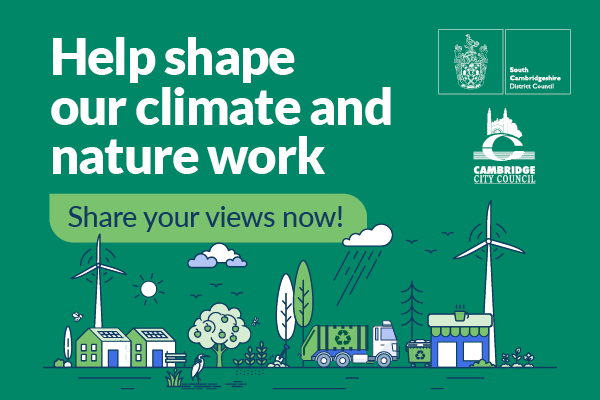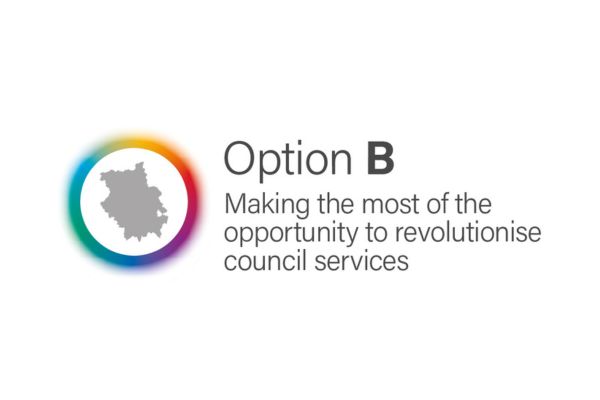South Cambridgeshire District Council and Cambridge City Council have teamed up to invite people to help shape the councils’ approaches to climate and nature work in the coming years.
The councils have set out transformative visions for a region where nature thrives, the air and rivers are clean, communities are resilient to the changing climate, and future generations can flourish. They are developing new strategies to take this work forwards and want local people and organisations to have their say.

Take the survey
You only need to take the survey once, using either link below. The responses will all be analysed together and made available to both councils.
- South Cambridgeshire District Council – open until 5 November
- Cambridge City Council – open until 9 November
Cllr Natalie Warren Green, Lead Cabinet Member for Environment, for South Cambridgeshire District Council, said: “We are keen to lead boldly in climate action, championing innovation, protecting nature, and building resilience for our communities. Tackling climate change is not only important for biodiversity but is also important in offering health benefits for residents, for example improved air quality will be of great benefit to many. In South Cambridgeshire, being ‘Green to our Core’ is more than a slogan, it’s a commitment embedded in everything we do. From delivering net-zero homes and restoring biodiversity, to investing £6.8 million in climate initiatives and shaping a Local Plan that puts sustainability first. We are determined to create a fairer, kinder, and greener district for all.”
Cllr Rosy Moore, Cabinet Member for Climate and Environment at Cambridge City Council, said: “We have been actively tackling climate change since 2007 and we are making great progress. The council's own emissions have reduced by 51.9% since the baseline in 2014/15, meanwhile the latest data from government shows Cambridge’s emissions have reduced by 47.3% since the baseline in 2005. Every action we take together makes a difference for the future and improves lives today – whether that’s bringing down energy bills, having cleaner air or more green spaces for people to enjoy, or supporting the creation of new green jobs. As we develop our strategy for 2026 onwards, understanding how local residents, businesses, innovators and community groups are thinking about climate and nature, or taking action already, is more important than ever. What else do you think we should focus on, or what else would help you to make progress in your life, workplace or business? Please tell us and help shape our strategy for the coming years. We can achieve so much more if we come together as a city.”
The two councils have several shared services, including Greater Cambridge Shared Planning and Greater Cambridge Shared Waste, meaning that many planned actions to tackle climate change and support nature recovery are shared – such as transitioning bin lorries from diesel to electric, and installing solar panels at the shared waste depot to charge them, minimising household waste, and developing planning policies that support low-carbon and biodiverse development.
Both councils are also committed to increasing green space, with South Cambridgeshire District Council planning to double land managed for nature from 7% to 14% by 2050, and Cambridge City Council increasing tree canopy from 17% to 20% by 2050.
South Cambridgeshire District Council is committed to a 75% reduction in emissions from its own operations by 2030, and a 50% reduction in emissions across the district by 2030 ahead of reaching net zero by 2050; meanwhile Cambridge City Council has a target to achieve net zero for its own buildings and fleet by 2030, and is working with partners towards net zero across the city too.
Further actions include installing more electric vehicle charging points, supporting local taxis to transition to zero or ultra-low emission taxis, retrofitting homes to bring down energy bills, supporting local food networks, and empowering communities through education and grants.
Both councils also have a focus on working with local businesses, supporting communities to be resilient to the changing climate, and ensuring the benefits of climate action are felt equally by local people. The councils recognise that climate action must be inclusive, with a strong emphasis on working with vulnerable communities, local businesses, parish councils, and community and voluntary organisations. Events, newsletters, and training will continue to be delivered to ensure everyone can play a role in shaping a sustainable future.
After the survey closes, the councils will use your feedback to help shape the final strategies, which are expected to be published in spring 2026, subject to approval by the councils’ Cabinet members.



